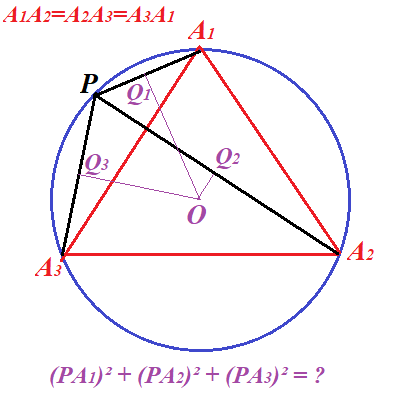Trigonometry+ 04
Problem A
Find the sums
Σk∈[0,n−1]sin²(x+k·π/n)
Solution A
First, convert sin²(...) into cos(...) by using the identity
cos(2φ) = cos²(φ) − sin²(φ) =
= 1 − 2sin²(φ)
from which follows
sin²(φ) = ½(1 − cos(2φ))
Now our sum looks like this
Σk∈[0,n−1]
½(1−cos(2x+2k·π/n)) =
= n/2 −
− ½Σk∈[0,n−1]cos(2x+2k·π/n)
To calculate Σk∈[0,n−1] above, let's use the result of the previous lecture Trigonometry 03 that proved the following
Σk∈[0,n]cos(x+k·y) =
= [sin(x+(2n+1)·y/2) −
− sin(x−y/2)] /
/ [2·sin(y/2)]
Since in our sum we have n terms instead of n+1, as in the formula above, to use this formula in our case we have to use n−1 instead of n, which will result in
Σk∈[0,n−1]cos(x+k·y) =
= [sin(x+(2n−1)·y/2) −
− sin(x−y/2)] /
/ [2·sin(y/2)]
To use this formula in our case, we have to substitute 2x instead of x and 2π/n instead of y.
In this case the numerator in the formula above would be
sin(x+(2n−1)·π/n) − sin(x−π/n)
The first term in the above expression for the numerator equals to
sin(x+(2n−1)·π/n) =
= sin(x+2n·π/n−π/n) =
= sin(x−π/n+2π) = sin(x−π/n)
(since the value 2π is a period of function sin)
which makes the first term exactly the same as the second term and they will cancel each other resulting in zero in the numerator.
That leaves the sum in our case to be equal to
Σk∈[0,n−1]
½(1−cos(2x+2k·π/n)) = n/2
Answer A
Σk∈[0,n−1]sin²(x+k·π/n) = n/2
Problem B
Given a regular n-sided polygon with vertices A1, A2,...,An inscribed into a circle of radius R with a center at point O and any point P on this circle.

Calculate the sum of squares of distances from point P to all vertices Ak
S = Σk∈[1,n](PAk)².
Hint:
Let ∠POAk = φk.
Then φk = φ1 + (k−1)·2π/n.
Use the results of Problem A.
Answer
S = 2nR²


No comments:
Post a Comment